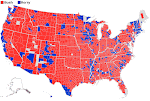Laffer: Obama's 'Train Wreck' Ahead
by Donald Lambro (more by this author)
Arthur Laffer, creator of the Laffer Curve that showed how low tax rates boost economic growth, is warning anyone who will listen that the economy is headed for a “train wreck” in 2011 that will make the current recession look tame by comparison.
The famed economist, whose supply-side, tax-cutting policies enacted by President Reagan in 1981 put the economy on a record-breaking, 25-year economic trajectory of growth and prosperity, is telling Americans not to be lulled by sporadic signs of growth this year, because the economy is headed for a sharper decline next year when tax rates are expected to jump sharply, sending the economy into a new tailspin.
“It will make the decline in U.S. output from 2010 to 2011 worse than the decline in output in 2008 and 2009 which will catastrophic,” Laffer said in an interview with HUMAN EVENTS.In a wide-ranging discussion about where the economy is headed, and the fiscal, tax and monetary reasons why, Laffer gives a bleak forecast of where President Obama and his administration are taking the country in the next three years -- which he predicts will end with Obama’s defeat in 2012. “Obama is a fine, very impressive person. He really is.
Unfortunately, everything that he is doing in economics is exactly wrong. He is a crappy president,” Laffer said. “Whenever a country is in the throes of spending too much and raising taxes, it’s a fiscal catastrophe in the making and this is what is happening now,” he said. The economy in the short-term this year “will continue to improve, growing by more than 4 percent. By the end of 2010 the unemployment rate could fall to as low as 7 percent and the Obama administration will be busting with pride and conceit,” Laffer told his clients in his latest economic outlook for the year ahead.
But don’t be fooled into thinking the economy is actually coming out of one of the worst recessions of the post-war era, because this year will be a false recovery, he adds. The downturn will begin again when “2011 will enter center stage, followed quickly by an economic catastrophe. All the factors that will make 2010 (and have already made the last half of 2009) look so good will reverse direction, and 2011 will be a train wreck,” he said in his forecast. The big reason, among several, is Obama’s plan to allow the Bush tax cuts to expire at the end of this year, and other tax increases the Obama administration intends to enact this year and next, and how businesses will respond to these tax changes.
“In anticipation of known tax increases the economy will shift income and output from 2011 -- the higher tax year -- into 2010 -- the lower tax year. As a result of this income shift, 2010 will look a lot better than it should, and 2011 will be a train wreck,” he predicts. “GDP growth in 2010 will be some 3 to 4 percent higher than it otherwise should be, thus green shoots,” he said. “The transfer of income from 2011 into 2010 will not only make 2010 [economic growth] higher than it otherwise would be, it will also make 2011 [economic growth] 3 and 4 percent lower than it otherwise should be because people have shifted income out of 2011 into 2010.”
“The effect of the shift in income on GDP growth in 2010, however, is going to be fairly substantial, but when the U.S. economy comes to 2011, the train’s going to come off the tracks.” But the tax picture also will grow darker this year as the country heads into the midterm elections, Laffer said. “In 2010 the U.S. will have a payroll tax rate increase, an estate tax increase and income tax increases. There’s also a tax increase coming in 2010 on carried interest. This rate will rise from its current level of 15 percent to 35 percent, and then it will rise again in 2011.” Many economists are predicting modest growth rates this year, but high unemployment, too, which the Federal Reserve Board’s economists are projecting will be in the mid-to-high 9 percent range into the fourth quarter.
Others say it could go higher. The national unemployment rate is at 10 percent, but if you count workers who have given up looking for work and those who are in temp jobs, the real jobless rate is over 17 percent. Last week, the Labor Department said that 43 states saw their unemployment rates rise in December, especially in key Democratic strongholds such as Ohio, Michigan, Pennsylvania and California. “We are presently in a dangerously risky economic environment, more risky than any in memory and that includes the 1970s,” said Stanford economist John Cogan, a former Reagan administration fiscal adviser. “The primary sources of that risk come from uncertainty about U.S. government economic policy.
In the area of taxation, personal income taxes, especially those on savings and capital formation, are set to rise substantially in a year,” Cogan told me. “How high tax rates will rise and what activities will be hit hardest creates a sizeable risk this year for investors and businesses.” Cogan is especially worried about the damage that will come from the administration’s “unprecedented peacetime deficits. Because we are in uncharted territory, there is considerable uncertainty about how bad the consequences of the run-up in debt will be. But we do know that they won’t be good.” The mountain of debt that Obama is piling up is breathtaking and Laffer says it will put unprecedented burdens on the economy that will only get worse under his proposed tax and spending policies. Federal, state and local government spending has climbed to 38 percent of GDP, with the federal government’s spending binge accounting for 27 percent of GDP, he said.
Earlier this month, Laffer presented his economic forecasts to several dozen conservative House members at a private policy briefing retreat held in Charlottesville, Va., sponsored by the Heritage Foundation. Laffer’s presentation was said to be the high point of the retreat. The reason: Laffer doesn’t mince words and placed economic growth options in front of the lawmakers in blunt and dramatic terms that few if any economists have the courage to tackle.For example, he remains convinced that Congress should never have spent the bailout money it has dished out so far, which he puts “at about $3 trillion. “We should have done nothing. I was pretty much alone in that position near the end of 2008,” he told me.“If you total what the government takes in the income tax, corporate tax, Social Security taxes, capital gains taxes, all of that adds up to $2.2 trillion in tax receipts and they spent $3.5 trillion,” he said. Instead of the massive bailouts, stimulus and other giveaway programs, Laffer says, “I would have had a federal tax holiday. No taxes of any sort for a year and nine months which comes out to $3.5 trillion.
“Can you imagine what would have happened to the economy. We’d have an unemployment rate of three percent and the economy would be growing like mad and we’d be way out of this problem,” he said. After one year in office, Obama’s $800 billion spending stimulus plan has provided little if any stimulus to the economy and produce few if any permanent new jobs. The administration promised that the unemployment rate would be down to about 7 percent by now, but in fact the jobless number has climbed higher as Obama’s job approval numbers have fallen sharply and an increasing number of Democratic lawmakers are in trouble or have decided not to seek re-election.
Obama’s answer is another spending “stimulus” bill of perhaps $200 billion or more, new, Draconian regulations and tax hikes on the nation’s troubled financial system, and moving ahead with costly health care plan, job-killing climate change bills and other legislation that will drive up the government’s massive debt. “All in all, the risk facing our economy from these policy uncertainties is severe,”
Cogan told me this week. “This uncertainty will certainly retard the economy’s recovery this year and, depending on what policy actions are taken, it could profoundly damage the economy in 2011 and subsequent years.”
Friday, January 29, 2010
Subscribe to:
Posts (Atom)
The Republican Club of Falcon presents member and visitors opinions and commentary. The views expressed are solely those of the author and are not necessarily the views of the RCF or its entire membership.

